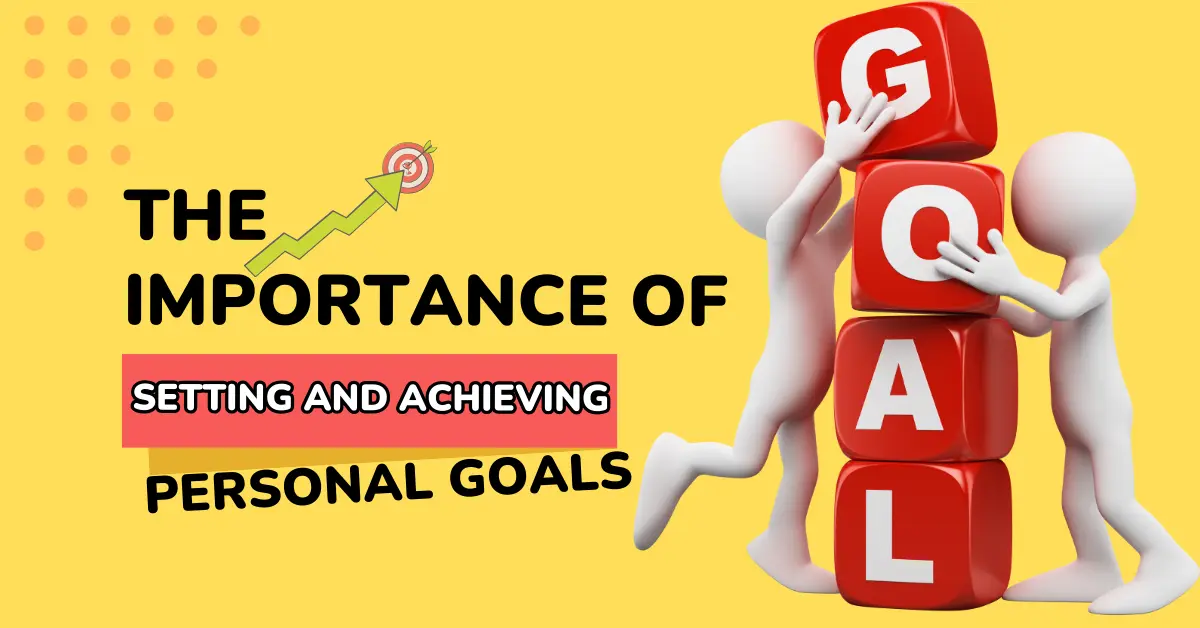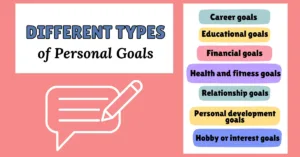
The Importance of Setting and Achieving Personal Goals
- 150
- 0
- 0
Have you ever felt like you’re just going through life without a clear direction? Do you feel like you’re always busy, but not making any progress? If so, you’re not alone. Many people feel this way. But there’s a simple tool that can help you change this: setting personal goals. In this blog post, we’ll talk about the importance of setting and achieving personal goals and how they can make your life better. We’ll also give you some tips on how to set good goals and reach them.
What Are Personal Goals?
Personal goals are things you want to achieve in your life. They can be big or small, for the near future or years from now. Some examples might be:
- Learning to play the guitar
- Saving money for a house
- Getting a promotion at work
- Running a marathon
- Starting your own business
Goals give you something to work towards. They help you focus on what’s important to you and give your life more meaning.
Importants Of Setting and Achieving Personal Goals

Setting and working towards personal goals has many benefits:
- They give you direction: Goals help you know where you’re going in life. Instead of just letting things happen, you can make choices that take you where you want to be.
- They motivate you: When you have a clear goal, it’s easier to get up and do the work needed to reach it. Goals can push you to do better and try harder.
- They help you measure progress: Goals let you see how far you’ve come. This can make you feel good about yourself and encourage you to keep going.
- They make you more confident: Each time you reach a goal, you prove to yourself that you can do hard things. This builds your self-confidence.
- They help you focus: Goals help you decide what’s important. This makes it easier to say no to things that might distract you from what you want.
- They make you happier: Working towards something you care about can make you feel more satisfied with your life.
- They push you to grow: To reach your goals, you often need to learn new skills or overcome challenges. This helps you grow as a person.
How to Set Good Personal Goals

Now that we know why goals are important, let’s talk about how to set good ones:
- Be specific: Instead of saying “Get fit,” try “Work out at the gym three times a week” or “Run a 5K race by June.”
- Make them measurable: Make your goals easy to measure so you can see when you achieve them. For example, “Be happier” is hard to measure, but “write down three things I’m thankful for each day” is simple to keep track of.
- Set a time limit: Having a deadline can help motivate you. It turns “someday” into a real plan.
- Write them down: Putting your goals on paper (or in a digital note) makes them feel more real and helps you remember them.
- Make them challenging but possible: Your goals should push you, but not be so hard that you give up.
- Make sure they’re your goals: Don’t set goals just because someone else thinks you should. Your goals should be things you truly want.
- Break big goals into smaller steps: If you have a big goal, break it down into smaller goals you can reach along the way.
How to Achieve Your Personal Goals

Setting goals is just the first step. Here’s how you can start working towards reaching them:
- Create a plan: Decide on the steps you need to follow to achieve your goal. Write these down too.
- Take action: Start working on your plan right away, even if it’s just a small step.
- Track your progress: Regularly check how you’re doing. This can help you stay motivated and see if you need to adjust your plan.
- Be consistent: Work towards your goals regularly, even if it’s just a little bit each day.
- Be flexible: If something isn’t working, be willing to change your approach. The goal is what matters, not the exact way you get there.
- Celebrate small wins: Don’t wait until you reach your final goal to feel good about your progress. Appreciate the little successes as you go along.
- Don’t give up: If you have a setback, that’s okay. Learn from it and keep going.
- Ask for help: Don’t be afraid to ask friends, family, or professionals for help or advice if you need it.
Common Challenges and How to Overcome Them
Even with the best intentions, you might face some challenges when trying to reach your goals. Here are some common ones and how to deal with them:
- Lack of motivation: Remember why you set the goal in the first place. Visualize how you’ll feel when you achieve it.
- Not enough time: Look at how you spend your time. Can you cut back on activities that aren’t as important to you?
- Feeling overwhelmed: Break your goal down into even smaller steps. Focus on just the next step.
- Fear of failure: Remember that failure is a normal part of learning and growing. Think of setbacks as chances to learn, not reasons to give up.
- Lack of support: Look for people who have similar goals. Join a group or find an online community for support.
- Losing focus: Regularly remind yourself of your goals. Put notes where you’ll see them often.
- Perfectionism: Remember that progress is more important than perfection. It’s okay if things aren’t perfect as long as you’re moving forward.
Different Types of Personal Goals

Personal goals can cover many areas of your life. Here are some types you might want to think about:
- Career goals: Getting a promotion, changing careers, starting a business
- Educational goals: Finishing a degree, learning a new skill, reading more books
- Financial goals: Saving for retirement, paying off debt, buying a house
- Health and fitness goals: Eating healthier, exercising regularly, quitting smoking
- Relationship goals: Making new friends, improving your marriage, being a better parent
- Personal development goals: Being more confident, managing stress better, learning to be more patient
- Hobby or interest goals: Learning to play an instrument, traveling to new places, mastering a craft
Remember, you don’t need goals in every area all at once. Concentrate on what matters most to you at this moment.
Conclusion
Setting and working towards personal goals is a powerful way to improve your life. Goals provide guidance, inspire you to take action and give your life meaning. They help you grow as a person and achieve things you might have thought were impossible.
Remember, the most important thing is to start. Choose a goal for today, even if it’s a little one. Write it down, create a plan, and take your first step toward achieving it. You might be amazed at what you can achieve when you have a clear goal to work towards. Don’t worry if you face setbacks or if things don’t go exactly as planned. That’s normal. What matters is that you keep trying, keep learning, and keep moving forward.
Your future is in your hands. By setting and working towards personal goals, you’re taking control of your life and shaping it into what you want it to be. So why wait? Start thinking about your goals today, and take that first step towards the life you want.
FAQs
1. Why are personal goals important?
Personal goals give direction to your life and help you focus on what matters most. They motivate you to work towards something, boosting self-confidence and helping you achieve personal growth.
2. How do personal goals improve motivation?
Setting goals creates a sense of purpose. When you know what you’re working towards, you’re more driven to take action and stay committed, making it easier to stay motivated and accomplish tasks.
3. What’s the best way to set personal goals?
Use the SMART method to set clear goals, that can be measured, realistic, important to you, and have a deadline. This helps break down big dreams into manageable steps, making them easier to reach and track progress.
4. How can achieving goals improve self-confidence?
When you reach a goal, no matter how small, you feel a sense of accomplishment. This boosts your self-confidence and encourages you to take on new challenges, building positive momentum in your life.
5. How do personal goals lead to a balanced life?
By setting personal goals in different areas—health, career, relationships—you create balance. Focusing on each aspect of your life ensures you’re growing in all areas, leading to a more fulfilled, balanced lifestyle.
Also Read:
How to Stay Productive at Work Or School
References:
https://pmc.ncbi.nlm.nih.gov/articles/PMC10291381/
https://pmc.ncbi.nlm.nih.gov/articles/PMC6796229/
https://en.wikipedia.org/wiki/Goal_setting
Disclaimer: The information shared in this blog on the importance of setting and achieving personal goals is intended for general guidance only. Individual experiences may vary. For personalized advice, please consult a professional coach or counselor.
Related post

7 Health Benefits of Assam Tea


